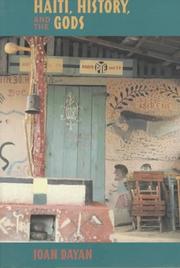| Listing 1 - 5 of 5 |
Sort by
|
Digital
Year: 1797 Publisher: Londres Impr. pour l'auteur par T. Baylis
Abstract | Keywords | Export | Availability | Bookmark
 Loading...
Loading...Choose an application
- Reference Manager
- EndNote
- RefWorks (Direct export to RefWorks)
Book
ISBN: 2707113972 9782707113979 Year: 1983 Volume: 68. Publisher: Paris: La Découverte/Maspero,
Abstract | Keywords | Export | Availability | Bookmark
 Loading...
Loading...Choose an application
- Reference Manager
- EndNote
- RefWorks (Direct export to RefWorks)
Indians of South America --- Indiens d'Amérique --- Early works to 1800 --- Ouvrages avant 1800 --- Thevet, André, --- Journeys --- America --- Brazil --- Amérique --- Brésil --- Early accounts to 1600. --- Discovery and exploration --- French. --- History --- Récits avant 1600 --- Découverte et exploration françaises --- Histoire --- Indiens d'Amérique --- Thevet, André, --- Amérique --- Brésil --- Récits avant 1600 --- Découverte et exploration françaises --- Indians --- French --- Early accounts to 1600 --- Indians - Early works to 1800 --- America - Discovery and exploration - French --- Brazil - History - French colony, 1555-1567 --- America - Early accounts to 1600
Book
ISBN: 128266087X 9786612660870 0520947916 9780520947917 9780520260535 9780520260542 0520260538 0520260546 9781282660878 Year: 2010 Publisher: Berkeley
Abstract | Keywords | Export | Availability | Bookmark
 Loading...
Loading...Choose an application
- Reference Manager
- EndNote
- RefWorks (Direct export to RefWorks)
Democratic Insecurities focuses on the ethics of military and humanitarian intervention in Haiti during and after Haiti's 1991 coup. In this remarkable ethnography of violence, Erica Caple James explores the traumas of Haitian victims whose experiences were denied by U.S. officials and recognized only selectively by other humanitarian providers. Using vivid first-person accounts from women survivors, James raises important new questions about humanitarian aid, structural violence, and political insecurity. She discusses the politics of postconflict assistance to Haiti and the challenges of promoting democracy, human rights, and justice in societies that experience chronic insecurity. Similarly, she finds that efforts to promote political development and psychosocial rehabilitation may fail because of competition, strife, and corruption among the individuals and institutions that implement such initiatives.
Democratization --- Political violence --- Humanitarian assistance --- Intervention (International law) --- Military intervention --- Diplomacy --- International law --- Neutrality --- Humanitarian aid --- International relief --- Violence --- Political crimes and offenses --- Terrorism --- Democratic consolidation --- Democratic transition --- Political science --- New democracies --- Haiti --- Politics and government --- Social problems --- Political systems --- Internal politics --- abuse of power. --- activists. --- anthropology. --- cia intervention. --- colonialism. --- democracy. --- ethics. --- ethnography. --- female survivors. --- foreign aid. --- french colony. --- government corruption. --- haiti. --- haitian victims. --- history. --- human rights. --- humanitarian aid. --- humanitarian mission. --- humanitarian organizations. --- humanitarian. --- imperialism. --- international aid. --- justice. --- military coup. --- moral anthropology. --- nonfiction. --- political insecurity. --- politics. --- poverty. --- social issues. --- social science. --- structural violence. --- trauma. --- violence against women. --- violence.

ISBN: 0520925173 9786612356544 1282356542 1597345490 9780520925175 0585390010 9780585390017 6612356545 0520224124 9780520224124 9781282356542 9781597345491 Year: 2001 Publisher: Berkeley University of California Press
Abstract | Keywords | Export | Availability | Bookmark
 Loading...
Loading...Choose an application
- Reference Manager
- EndNote
- RefWorks (Direct export to RefWorks)
Peter Zinoman's original and insightful study focuses on the colonial prison system in French Indochina and its role in fostering modern political consciousness among the Vietnamese. Using prison memoirs, newspaper articles, and extensive archival records, Zinoman presents a wealth of significant new information to document how colonial prisons, rather than quelling political dissent and maintaining order, instead became institutions that promoted nationalism and revolutionary education.
Nationalism --- National liberation movements --- Prisons --- Consciousness, National --- Identity, National --- National consciousness --- National identity --- International relations --- Patriotism --- Political science --- Autonomy and independence movements --- Internationalism --- Political messianism --- Liberation movements, National --- Revolutions --- Anti-imperialist movements --- Dungeons --- Gaols --- Penitentiaries --- Correctional institutions --- Imprisonment --- Prison-industrial complex --- History. --- Prisons - Vietnam - History. --- National liberation movements - Vietnam - History. --- Nationalism - Vietnam - History. --- History --- archives. --- colonial power. --- colonial prisons. --- colonialism. --- colonies. --- dissent. --- documentary history. --- empire. --- french colonialism. --- french colony. --- french history. --- history. --- imperialism. --- imprisonment. --- indochina. --- indochine. --- memoir. --- military. --- nationalism. --- newspapers. --- nonfiction. --- oral history. --- political dissent. --- political prisoners. --- prison memoir. --- prison system. --- prison. --- rebellion. --- resistance. --- revolution. --- vietnam. --- vietnamese history. --- vietnamese nationalism. --- vietnamese.

ISBN: 0520089006 0520920961 0585176469 9780520920965 9780585176468 9780520089006 0520213688 9780520213685 Year: 1995 Publisher: Berkeley
Abstract | Keywords | Export | Availability | Bookmark
 Loading...
Loading...Choose an application
- Reference Manager
- EndNote
- RefWorks (Direct export to RefWorks)
In Haiti, History, and the Gods, Joan Dayan charts the cultural imagination of Haiti not only by reconstructing the island's history but by highlighting ambiguities and complexities that have been ignored. She investigates the confrontational space in which Haiti is created and recreated in fiction and fact, text and ritual, discourse and practice. Dayan's ambitious project is a research tour de force that gives human dimensions to this eighteenth-century French colony and provides a template for understanding the Haiti of today. In examining the complex social fabric of French Saint-Domingue, which in 1804 became Haiti, Dayan uncovers a silenced, submerged past. Instead of relying on familiar sources to reconstruct Haitian history, she uses a startling diversity of voices that have previously been unheard. Many of the materials recovered here-overlooked or repressed historical texts, legal documents, religious works, secret memoirs, letters, and literary fictions-have never been translated into English. Others, such as Marie Vieux Chauvet's radical novel of vodou, Fonds des Nègres, are seldom used as historical sources. Dayan also argues provocatively for the consideration of both vodou rituals and narrative fiction as repositories of history. Her scholarship is enriched by the insights she has gleaned from conversations and experiences during her many trips to Haiti over the past twenty years. Taken together, the material presented in Haiti, History, and the Gods not only restores a lost chapter of Haitian history but suggests necessary revisions to the accepted histories of the New World.
Haiti-- Civilization-- Philosophy. --- Nationalism --- Social psychology and literature --- Regions & Countries - Americas --- History & Archaeology --- Latin America --- Religious aspects --- History --- Haiti --- Civilization --- Philosophy. --- Religion. --- Religious aspects. --- History. --- Consciousness, National --- Identity, National --- National consciousness --- National identity --- Ayiti --- Quisqueya --- République d'Haïti --- Republic of Haiti --- Repiblik d Ayiti --- Bohio --- Haytian Republic --- Literature --- International relations --- Patriotism --- Political science --- Autonomy and independence movements --- Internationalism --- Political messianism --- Repiblik Ayiti --- Hayti --- ハイチ --- Haichi --- Saint-Domingue --- Religion --- Philosophy --- Haiti - Civilization - Philosophy. --- هايتي --- Гаити --- Gaiti --- 1800s. --- 18th century. --- colonial. --- colonialism. --- colonization. --- cultural context. --- discourse. --- diversity. --- french colonies. --- french colony. --- french language. --- haiti. --- haitian culture. --- haitian history. --- haitian. --- island country. --- island culture. --- island. --- legal documents. --- letters. --- literary fiction. --- memoirs. --- modern world. --- new world. --- postcolonial. --- race. --- racism. --- religious texts. --- translation. --- vodou. --- world history.
| Listing 1 - 5 of 5 |
Sort by
|

 Search
Search Feedback
Feedback About UniCat
About UniCat  Help
Help News
News